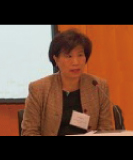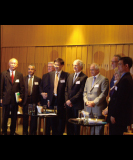You are browsing > Service Trade > APSC
More urgent action needed to improve services competitiveness in APECAsia Pacific Services Coalition
By Jane Drake-Brockman
Media Release: Asia Pacific Services Coalition
Urgent APEC action is needed to arrest the recent increase in services trade restrictions. This was the key business message from the Asia Pacific Services Coalition, meeting in August in the margins of the 3rd APEC Senior Officials’ Meeting in Port Moresby.
The APSC congratulated the government of Papua New Guinea for making decisive moves to enhance APEC’s record on services stakeholder consultation. Papua New Guinea demonstrated strong leadership by inviting all members of the APSC, including members of the APEC Business Advisory Council (ABAC), to address an APEC Public-Private Dialogue (PPD) on implementation of the 2016-2025 APEC Services Competitiveness Roadmap (ASCR). With 20 speakers, drawn largely from the regional business community, and an agenda focussed on e commerce and the transformation to digitisation, the PPD witnessed repeated business calls for more urgency in APEC action on services.
“The latest OECD measures of services trade restrictiveness show the business environment is becoming more restrictive not less,” said Jane Drake-Brockman, Australian Services Roundtable. “Services businesses are experiencing increased regulatory fragmentation, including in the APEC region,” she said. “The APSC targets are at risk – we are nearing the mid-point review and APEC is not on track.”
With rapid technological transformation and business innovation underway, there is on-going need for regular stakeholder engagement. “Tapping into the business community for practical insights on facilitating services trade is essential,” said Guillermo Luz, ABAC Philippines and Philippine Services Coalition. “PPDs should be targeted to delivering concrete recommendations to address the challenges.”
“Opportunities for businesses are being missed,” said Chey Scovell, PNG Business Council. “Business wants to see reforms that effectively address the existing and recently introduced restrictive measures that we all know are constraining economic growth within the region.”
“The business community is eager to see positive results. We consider there are low-hanging fruits where APEC should be able to see quick gains, like enhancing the APEC Business Travel Card,” said Ho Meng Kit, Singapore Business Federation and ABAC Services Champion. “We urge APEC to make speedy progress to develop the index for measuring services trade restrictiveness in the region,” he said.
The biggest business irritants being regulatory disconnects across the region, the APSC is also calling for a higher degree of regulatory cooperation. The APSC hopes that 2018 will deliver agreement on APEC Principles on Domestic Regulation in the Services Sector. But business also warns that what amounts to “best practice” in the traditional economy might need some rethinking for the digital economy; the APSC welcomes the attention being given to this matter in the APEC Economic Committee.
Responding to openness to greater business input on the part of Krasna Bobenrieth, Chair of the APEC Group on Services, the APSC committed to take a more active role and to coordinate its efforts closely with ABAC. The next APSC meeting will take place alongside ABAC 2 in Jakarta in April 2019; the two organisations will collaborate in areas of common interest such as tourism, education, professional services, women in services, ICT and digital trade.
Launched in Cebu, Philippines in 2015, the Asia Pacific Services Coalition (APSC) – composed of the major business organizations focused on services in the Asia Pacific region – agreed to develop closer cooperation and dialogue aimed at fostering growth and efficiency in the services sectors. For more information or further comment, contact ASPC co-convenor Jane Drake-Brockman at +61 497 679 917.









